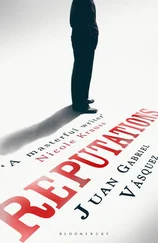Claire turned on the living room light just long enough to get to the kitchen, and the kitchen light just long enough to fill a plastic IKEA glass with water. She was turning off light switches as she walked through her house as if she were alone there. But the porch light stayed on, waiting for Philippe. We went upstairs without speaking, and on the second floor, Claire took a telephone with a long cord out of the study and left it on the stairs, against the banisters.
“If you come downstairs, be careful not to trip.”
“You should put a phone in your bedroom,” I said. “Like we do back home.”
“Yes, I know. You’ve told me that before.”
I went up to the guest room, on the fourth floor, and found that I could move around without turning on the light, because there was a skylight in the ceiling and the brightness of the street illuminated the outlines of things: the tall headboard of the wooden bed, the wardrobe filled with clean towels. The noise of a nearby party could be felt through the walls, an electronic beat of intense bass notes that echoed in my stomach. I closed my eyes, tried not to listen. The house was dark, but not asleep: it was impossible to forget my wide-awake hostess waiting in that very particular way waiting for a telephone call becomes, such a modern kind of waiting, undoubtedly more anguished than the old waits in romantic novels, because there’s nothing more sudden than a phone ringing and there are no other situations where you can go, in less than a second, from well-being to loss. Waiting for someone implies their footsteps before they arrive at the door and waiting for a letter implies the time the envelope spends in our hands before being opened, but a phone call changes the world in an instant: it’s not there, and then it is. That’s how fast things happen.
I woke up when the phone rang. Somehow I’d fallen asleep, unaware.
I tried to hear, unsuccessfully. The creaky wooden floors prevented me from going down the stairs and listening to the conversation without being discovered. But the silence was not total: Claire’s murmuring, thin and soft as tends to happen when we speak to someone who loves us, reached me from afar, through the rude rhythms of the neighbors’ music. Claire spoke for three, maybe four minutes. I heard her hang up; I didn’t hear her close her bedroom door. I decided to go down: the bathroom, after all, was downstairs. I would have that pretext if I needed one.
I found her sitting on the third step, in front of the open door to her room, with the yellow light from the street barely illuminating the space her compressed body took up on the stairs. She was hugging her knees tight to her chest with her head between her arms, like a beggar in the subway. I put a hand on her shoulder: it was one of the first times I’d touched her (she was or is Belgian, and in spite of our friendship, physical contact was or is unusual and restrained), and Claire raised her head and I saw that she was crying softly, silently.
“The boy died,” she said. “Philippe isn’t coming home tonight, he’s staying with his sister.”
I thought of his sister’s husband, the man who, according to Monsieur Gibert, mistreated her.
“And her husband…”
“Of course, him too. Imagine that guy’s rage when he finds out his son is dead.”
“They don’t live together?”
“It’ll be her fault, of course, she sent the child off on the excursion. And the guy’s rage. Shit, I’d be scared to death, wouldn’t you? Of course, they’re all expecting Philippe to be there to protect them. And who’s going to protect him? Who’s going to comfort him?”
She picked up the receiver and dialed a long number.
“Good evening. I’d like a taxi, please.”
—
THE DRIVER, a Flemish man whose mustache completely covered his mouth, took us to our destination in twenty minutes. Schaerbeek was a neighborhood or suburb I’d been through on the train once or twice, on my way to the airport. Claire had never been to the house we were looking for, but she had an address taken from the invitation list for their wedding. The place just seemed dead: the sidewalks were dull cobblestones, and cars slept on both sides of the road. They were not the latest models: there were Fiats and Renaults from the early eighties, and they all had stickers on the bodywork or the bumpers, glow-in-the-dark cartoons making love in every possible position, or Flemish phrases — signs of admiration, underlined words — which I didn’t understand and had no interest in deciphering. The taxi pulled over and slowed to a walking pace. On the dark brick or gray stone walls, beside windows adorned with lace curtains, the house numbers came into view and disappeared again. When Claire found the one we were looking for, she said:
“It’s here. Stop, please.”
But we didn’t get out immediately.
“Are you sure?” I said.
“Of course not. If I were sure, everything would be easier.”
“Seven hundred and ninety,” said the taxi driver.
“Keep the change,” said Claire.
And there we were, the only two people on the empty street, the collars of our coats turned up (Claire was better protected with her black shawl), frowning at the cold. We looked up toward the second floor of the house, where the windows were boxes of silent light.
“It must be there. Philippe has told me about this, the house is divided into apartments. They don’t get along with the neighbors and the common areas are filthy with grime because nobody wants to clean them.”
It was number 8 Rue Goossens. The eight was wrought iron, sticking out from the concrete wall. Claire approached the list of doorbells, her index finger running down the four names. “Ah,” she said, and pressed a button. From the street we could hear an intercom buzzing. Someone I didn’t recognize looked out the window; presumably it was the same person whose voice came through the intercom.
“Who is it?”
“Claire Gibert. Claire Vial. Philippe’s wife. Good evening, madame.”
I’d never heard her introduce herself with her married name. The intercom went silent again and then a new buzz sounded, this time the door. I opened it and we stepped into the dark hallway. The stairs were on the right, and Claire walked toward them as if she knew the way, suddenly in a hurry. I followed her, but I didn’t take my hand off the rough handrail for a second.
Philippe was waiting for us in front of the half-closed door to the apartment. He looked at me and it was as if he were blaming me for something. He was wearing a black, unironed shirt, half untucked like an untidy schoolboy. Behind him there was nothing but silence. I had expected murmurs, accusations, disapproval, gossip.
“What are you doing?” he said to Claire.
“I couldn’t not be with you,” she said. “I love you and I wanted to be with you.”
“This isn’t… she’d rather be alone right now, you know. She’d rather that we—”
Then two doors opened: the neighbors’ and the one Philippe was guarding like a soldier in some fairy tale. The neighbor had a patch over his left eye and was wearing a red dressing gown. The woman who came out behind Philippe had too steady a face to be his sister.
“Mais, qu’est-ce que vous faites?” said the neighbor. “Could you not carry on your little chat inside your house?”
“We are inside our house,” said Philippe.
“We’re in our house,” said the neighbor.
“And watch your manners, if you don’t want a punch in the face.”
“Let’s go in,” said the woman. “Philippe, it’s not worth it.”
“Salauds,” said the neighbor.
“Vieux con,” said Philippe.
“In,” said the woman.
She closed the door and some bells jingled (they were copper, tied with red and green thread). Philippe took them down off the door hook.
Читать дальше










